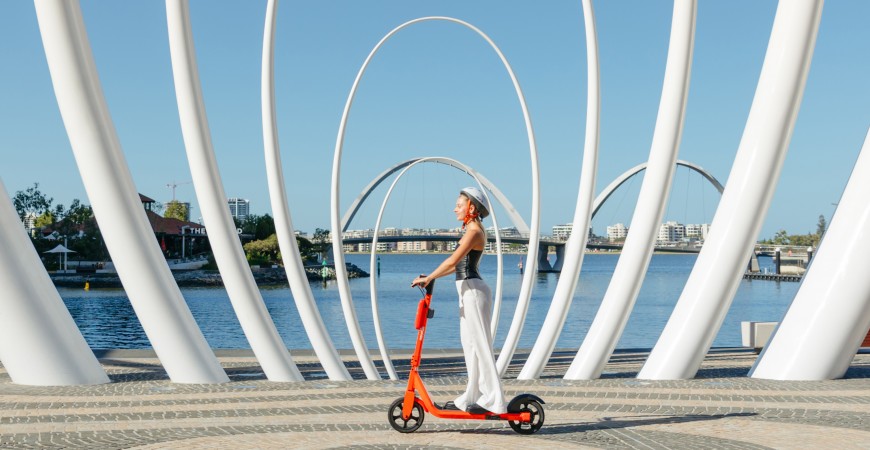One of the big challenges of the transition to net zero is getting people out of their cars and into other modes of transportation.
For major cities, public transport options are well equipped to take you from the suburbs to the CBD, but can struggle to cater to intracity travellers.
In Perth, Central Area Transit buses are regular and free, but they are just as much at the mercy of traffic conditions as a car and can often be outpaced by a fast walker in heavy traffic.
While walking has a range of health benefits, Perth’s dry heat can make any extended pedestrian journey particularly unappealing at certain times in the year and isn’t practical for people with mobility issues. Clearly, a more nuanced solution is needed.
Enter Neuron Mobility, an e-scooter rental company seeking to reduce reliance on cars to reduce emissions and improve safety for commuters and tourists seeking to break their automobile addiction.
Using innovative geofencing technology that limits the speed of the company’s e-scooters based on location to improve safety and a commitment to carbon neutrality, the short-term rentals are an affordable and credible low-polluting alternative to motor vehicles.
The company’s distinctive orange e-scooters are ubiquitous in the Eastern States, but are only a recent addition to the West Australian transport network.
Starting with a 12-month trial in the City of Stirling, followed by Busselton this summer, Neuron has just announced a two-year trial with the City of Perth, encompassing the CBD, East Perth, Crawley and Northbridge.
One of Neuron’s biggest selling points is the ability to break free of traffic gridlock in major urban centres, making its e-scooters an ideal fit for office workers making short trips or tourists seeking to explore all that Western Australia’s capital city has to offer.
In addition to the physical features like wide footplates and larger wheels that make Neuron’s e-scooters demonstrably safer than many retail models, the company’s software has innovative features that improve rider safety in urban settings.
These include topple detection which alerts Neuron’s patroller if an e-scooter has fallen over, a 000 emergency button which detects if a rider has had a fall and then helps them call the emergency services via their smartphone, and, crucially, a ‘Follow My Ride’ function that allows riders to share their trip online with friends and family in real-time for added security and peace of mind.
Beyond these features of the scooters themselves, the company has shown a commitment to on-the-ground actions to improve road safety for e-scooter riders and the community it operates in. For the Perth trial, the official launch on March 18 will coincide with a ScootSafe event from 10:00am to noon at Forrest Chase. Riders who visit the ScootSafe events will have the opportunity to participate in a short safety briefing and will be able to earn rewards such as free credits for future rides. Riders will also be directed to the company’s industry-leading online education platform ScootSafe Academy, where they can complete gamified education modules teaching them how to ride an e-scooter safely.
Visitors and workers won’t be the only ones welcoming the trial of the scooters, with a recent report titled Shared Rides, Shared Wealth revealing two thirds of Neuron e-scooter journeys across Australia result in a purchase from a local business.
According to the report, each Neuron e-scooter contributes $70,000 to local economies per year, with riders spending an average of AUD $65 at local businesses per trip.
While it will take more than a brightly coloured e-scooter to solve Australia’s transport emissions challenges, having a genuine, viable alternative from sustainability-driven organisations like Neuron Mobility is an important step forward.
Note, Neuron Mobility is a client of ReGen Strategic.
 ReGen Strategic
ReGen Strategic